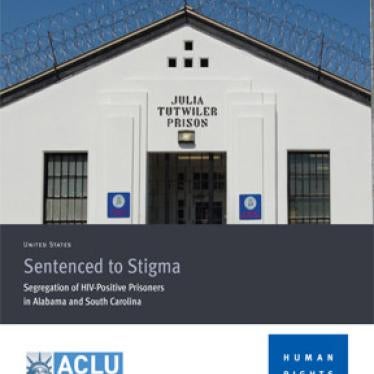|
Commentary
US: South Carolina Is Unfair to Prisoners Who Have HIV
Published in:
South Carolina Post and Courier
On the Friday before Christmas, a federal judge in Alabama ordered an end to 25 years of segregation of HIV-positive prisoners in state prisons. District Court Judge Myron Thompson ruled that segregating HIV-positive prisoners in separate housing with unequal program opportunities, inferior mental health care and fewer work options violated the Americans with Disabilities Act.
This landmark decision leaves South Carolina the only state in the Union that segregates prisoners with HIV. It is high time South Carolina abandoned this unnecessary, harmful and discriminatory policy.
The practice of segregating prisoners with HIV dates back to the 1980s, when AIDS was a fatal disease that was not well-understood. It may have been permissible in those days to protect the general population of prisoners from a contagious illness without cure. In 2013, however, HIV is no longer a mystery disease, and we now know that segregating prisoners is unnecessary and harmful. The current science of HIV and respect for human rights demands a different approach.
HIV is not transmitted by spitting or biting, through food services or casual contact. Its primary modes of transmission — sexual intercourse or exchange of blood through needles — can be controlled and reduced in any well-run correctional facility. There is still no cure for HIV, but living with the disease is far less complex than it used to be, as anti-retroviral drugs have turned HIV into a manageable chronic condition.
For the majority of patients, primary care physicians and nurses can handle the tests and treatment, with visits to specialists needed only two to three times a year. Treatment is now also prevention, as medication suppresses the virus, dramatically lowering the risk of transmitting the infection. The U.S. Centers for Disease Control and other public health authorities now endorse treatment as a key part of HIV prevention both in and out of correctional settings.
In 2010, Human Rights Watch and the ACLU published “Sentenced to Stigma,” which documented the harsh consequences prisoners faced when segregated in Alabama and South Carolina. They told us of the humiliation, prejudice, and the pain of being “outed” to other inmates and to their families when placed in an HIV unit.
We also found that all HIV-positive prisoners in South Carolina were sent to a single high-security unit, even when convicted of a relatively minor crime. For example, one prisoner we interviewed was serving a three-month sentence yet was assigned to the HIV unit at Broad River, a maximum security facility that houses death row inmates.
South Carolina also denies work release to prisoners with HIV, undermining the potential for hundreds of inmates each year to rehabilitate themselves. One prisoner told us that work release was “my only chance to get a job and rebuild my life when I finish my sentence.” With every work release opportunity that is unfairly denied, South Carolina loses a chance to regain a taxpaying citizen.
Despite widespread criticism of the policy, including from the U.S. Department of Justice, South Carolina officials defend it, saying it makes it easier to deliver medical care for the approximately 400 HIV-positive inmates in the state prisons. The director of South Carolina's Department of Corrections from 2003-2011, Jon Ozmint, recently conceded that the policy may not be medically “necessary,” but “We think it is best.”
Responding to similar arguments in Alabama, though, Judge Thompson noted that prison systems all over the country have managed to provide adequate medical care for HIV without prohibitive cost. He concluded that the “segregation policy is based on outdated and unsupported assumptions about HIV and the prison system's ability to deal with HIV-positive prisoners.”
Twelve years ago, a federal court in South Carolina upheld the segregation policy, refusing to interfere in the state's determination that segregation was justified for prison safety and health.
But today the evidence to the contrary is overwhelming: health care can be delivered without this policy that promotes stigma, fear and discrimination. Segregation may be more convenient for prison officials, but it has now been declared illegal.
Soon, 49 states will be treating HIV-positive prisoners with a modern, fair and workable approach. It is time for South Carolina to join them.
Megan McLemore is a senior health researcher at New York City-based Human Rights Watch.
Your tax deductible gift can help stop human rights violations and save lives around the world.
Region / Country
Most Viewed
-
November 25, 2019
A Dirty Investment

-
June 3, 2025
“They’re Ruining People’s Lives”

-
December 21, 2023
Meta’s Broken Promises

-
January 25, 2024
“We’re Dying Here”

-
February 19, 2018
“All We Want is Equality”


